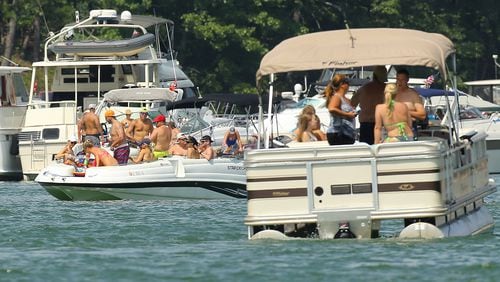Georgia law is clear: don't drink and boat, even during the holiday weekends.
Piloting a boat under the influence on waters like Lake Lanier could land party-goers in jail, according to the Department of Natural Resources.
"For the longest time, it was a common practice to drink and boat," Mark McKinnon, public affairs officer for the DNR law enforcement division, told The Atlanta Journal-Constitution. "It sort of came together. With all the laws coming into play, people are getting the message."
The DNR asks boaters to do three things: be courteous on the lake, wear your life jacket and don't drink and boat.
"There will be a lot of boats out there going in a lot of different directions," McKinnon said. "Please be courteous out on the lake, especially... as we get into the summer."
What are the boating drinking laws in Georgia?
In Georgia, it is a crime to BUI: boat under the influence of drugs or alcohol. The state has stiff penalties for a person piloting a boat if his or her blood-alcohol content is 0.08 or higher - the same limit for operating a motor vehicle on the state’s roadways.
"It is legal to drink on a boat if you are of age," McKinnon said. "Just don't boat and drink. It's like drinking while driving - it's a dangerous thing."
The state's legal alcohol limit for boat drivers was 0.10 until Senate Bill 136 tightened the rules on boating and increased the penalties for those caught boating drunk.
Those arrested for boating under the influence will be charged with a misdemeanor punishable by fines up to $1,000 and/or jail time up to one year, according to the Georgia Boat Safety Act.
Those under the age of 21 and that are above the alcohol limit of .02 are also considered under the influence by the DNR.
The bill was prompted by the deaths of three boys in boating accidents at Lake Lanier in the summer of 2012. Jake and Griffin Prince died in June after an intoxicated boater slammed into their family's boat. Kile Glover, the son of R&B singer Usher's former wife, died a month later after a boater ran over him and a 15-year-old girl.
Despite the laws, accidents still occur when drinking and boating mix together.
One teenager was charged with BUI after another lost his foot in an accident on Lake Lanier this weekend, officials said.
What about "floating under the influence" in Georgia?
HB 172, which allows "floating under the influence," was passed by the Georgia legislature earlier this year and signed into law by Gov. Nathan Deal on May 3.
The law changes the state's boating laws, making drinking a beer on an inflatable raft close to shore on a non-flowing body of water legal and differentiating it from boating under the influence.
Other important boating rules and regulations
There are no hours of operation for lakes and rivers. Someone can operate a boat on a lake at any time, as long as the boat lights are turned on at night. Personal watercraft, such as jet skis, are not allowed before sunrise or after sunset.
How close is too close? Know the "100-foot law." Boat operators are required to slow to idle speed when within 100 feet of docks, piers, bridges, shorelines or people in the water, according to the DNR. "There are no speed limits on a lake, but speed can be an factor [in accidents]," McKinnon sad.
Know where your life jacket is. The DNR says there must be one Coast Guard-approved life jacket for every passenger on a boat over 16 feet long. Every passenger under 13 years old must wear a life jacket at all times on any moving boat, unless the child is in an enclosed boat cabin.
"It's the equivalent of a seat belt in your car," McKinnon said. "We encourage everyone to be wearing it."
If you are on a paddleboard, you must be wearing a life jacket or have a life jacket within reach. Paddleboarders under 13 years old must always be wearing a life jacket.
"If a boating incident occurs, it will be very unlikely you grab that jacket as you are ejected from the boat," he added. "It's rare we pull a victim from the bottom of a lake with a life jacket on."






